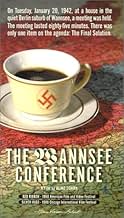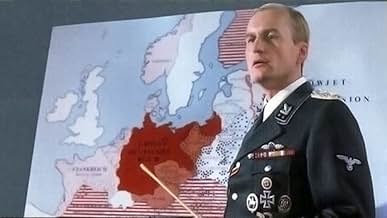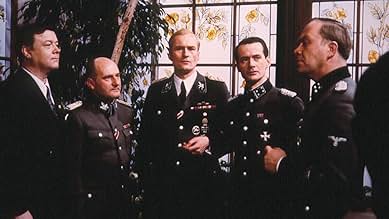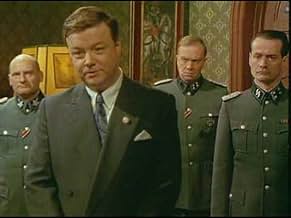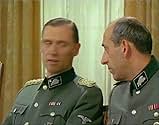IMDb RATING
7.7/10
1.4K
YOUR RATING
At the Wannsee Conference on January 20, 1942, senior Nazi officials meet to determine the manner in which the so-called "Final Solution to the Jewish Question" can be best implemented.At the Wannsee Conference on January 20, 1942, senior Nazi officials meet to determine the manner in which the so-called "Final Solution to the Jewish Question" can be best implemented.At the Wannsee Conference on January 20, 1942, senior Nazi officials meet to determine the manner in which the so-called "Final Solution to the Jewish Question" can be best implemented.
Friedrich G. Beckhaus
- Heinrich Müller
- (as Friedrich Beckhaus)
Hans-Werner Bussinger
- Martin Luther
- (as Hans W. Bussinger)
Werner Asam
- Heydrich's Adjutant
- (uncredited)
- Director
- Writer
- All cast & crew
- Production, box office & more at IMDbPro
Featured reviews
Far above the bathetic histrionics of Kenneth Branagh in the recent "Conspiracy", this crisply chilling, almost real-time reenactment is among the most convincing works of historical evocation on celluloid.
Not so much because its overall interpretation is historically valid: as I noted in my review of "Conspiracy", there are grave doubts whether the Wannsee meeting can bear anything like the watershed significance historians imputed to it between c. 1960 and 1980. More recent research has pointed to the Conference being more or less what the one remaining "Protokoll" (summary minutes) stated: a second-level pow-wow of bureaucrats to arrange for the deportation of Jews to the German-occupied East, not a master plan for their destruction cooked up by leading Nazis.
But that is by the way. "Wannseekonferenz" ably conveys the peculiar ethos of German (by no means all Nazi) officials and soldiers in the pivotal years of World War Two, when the nation seemed to be on top of Europe but was already getting jitters about its staying power. As the Interior Ministry's moderate Dr Stuckart, between wipes of his nose, points out: neither the British Empire nor the Soviet Union has yet been defeated, America is about to join in (the date is a month after Pearl Harbor) and there is danger in sweeping assimilated Jews and mixed-race people out of the Reich. Some will escape to become mortal enemies of it when they might be co-opted. Other participants crudely call for total banishment of Jewry from the Altreich and the Polish "Generalgouvernement", grumbling about disease; but there are war-production and morale arguments on the other side, and the uniforms who start by seeming to spring wholesale evacuation on the suits as a fait accompli- Heydrich and "my Jewish consultant, Eichmann"- are willing to ponder exemptions.
All this is a far cry from the Goldhagenesque "eliminationist antisemitism" uncritically portrayed in "Conspiracy". The German film is a more plausible picture of the clashes and compromises, the tired banter and one-upmanship, the relief of dirty jokes and the solemn courtesies one would expect of a gaggle of Teutonic bureaucrats who don't feel as assured of victory as they have to pretend. The film is little more than facial expressions and dialogue, batted to and fro across the table; but every actor is right inside his part. The sense of a warped community is potent, and the prowling encirclement by Heinz Schirk's camera reinforces this solidarity instead of just trying to fluff up the monotony of a bunch of men (and one shockable stenographer) talking.
Dietrich Mattausch looks far more like the real Reinhard Heydrich- tall, elegant fencer and violinist with a streak of treachery- than stocky little Branagh. His unfailing politeness, with a hint of cold steel underneath, is more convincing than Branagh's Demon King. This man knows what he wants, but his chairmanship is skilfully emollient.
Gerd Bockmann's Eichmann is assiduous and dispassionate like the real Adolf E, who had no great personal animus towards Jews but was determined to get ahead in his sordid profession of "dispatcher". Peter Fitz as Stuckart, the Jonah of the gathering, hints at distaste for the whole business while manfully arguing a pragmatic case for letting sleeping dogs lie. Among the smaller parts, Martin Luttge as Major Dr Rudolf Lange- intellectual turned persecutor in an SS Special Action Group- stands out for his affectation of rough, half-reluctant practicality, telling civilian papershufflers the score.
Inevitably a few embroideries have crept in: Heydrich's pursuit of the secretary, Lange's dog, the contemptuous anecdote about the Papal Nuncio. As if tacitly admitting the lack of hard evidence for orchestrated genocide from the minutes, the screenplay chucks in a throwaway line: Heydrich speaks of finding a new way of killing Jews fast by "learning to take the Fuhrer literally". Stuckart tells Dr Kritzinger that this refers to a "Mein Kampf" passage about how the Great War could have been won if subversive, high-ranking German Jews back home had been held under poison gas. We are supposed to infer a whiff of Zyklon B from this; but as is clear in context, Hitler meant that those Jews should have had to inhale British poison gas as front-line soldiers, like himself.
Such gaseous garnishings were probably required to make the film an accepted part of the curriculum in the guilt-ridden German system of historical re-education. But they do not seriously detract from this superbly atmospheric chamber piece.
Not so much because its overall interpretation is historically valid: as I noted in my review of "Conspiracy", there are grave doubts whether the Wannsee meeting can bear anything like the watershed significance historians imputed to it between c. 1960 and 1980. More recent research has pointed to the Conference being more or less what the one remaining "Protokoll" (summary minutes) stated: a second-level pow-wow of bureaucrats to arrange for the deportation of Jews to the German-occupied East, not a master plan for their destruction cooked up by leading Nazis.
But that is by the way. "Wannseekonferenz" ably conveys the peculiar ethos of German (by no means all Nazi) officials and soldiers in the pivotal years of World War Two, when the nation seemed to be on top of Europe but was already getting jitters about its staying power. As the Interior Ministry's moderate Dr Stuckart, between wipes of his nose, points out: neither the British Empire nor the Soviet Union has yet been defeated, America is about to join in (the date is a month after Pearl Harbor) and there is danger in sweeping assimilated Jews and mixed-race people out of the Reich. Some will escape to become mortal enemies of it when they might be co-opted. Other participants crudely call for total banishment of Jewry from the Altreich and the Polish "Generalgouvernement", grumbling about disease; but there are war-production and morale arguments on the other side, and the uniforms who start by seeming to spring wholesale evacuation on the suits as a fait accompli- Heydrich and "my Jewish consultant, Eichmann"- are willing to ponder exemptions.
All this is a far cry from the Goldhagenesque "eliminationist antisemitism" uncritically portrayed in "Conspiracy". The German film is a more plausible picture of the clashes and compromises, the tired banter and one-upmanship, the relief of dirty jokes and the solemn courtesies one would expect of a gaggle of Teutonic bureaucrats who don't feel as assured of victory as they have to pretend. The film is little more than facial expressions and dialogue, batted to and fro across the table; but every actor is right inside his part. The sense of a warped community is potent, and the prowling encirclement by Heinz Schirk's camera reinforces this solidarity instead of just trying to fluff up the monotony of a bunch of men (and one shockable stenographer) talking.
Dietrich Mattausch looks far more like the real Reinhard Heydrich- tall, elegant fencer and violinist with a streak of treachery- than stocky little Branagh. His unfailing politeness, with a hint of cold steel underneath, is more convincing than Branagh's Demon King. This man knows what he wants, but his chairmanship is skilfully emollient.
Gerd Bockmann's Eichmann is assiduous and dispassionate like the real Adolf E, who had no great personal animus towards Jews but was determined to get ahead in his sordid profession of "dispatcher". Peter Fitz as Stuckart, the Jonah of the gathering, hints at distaste for the whole business while manfully arguing a pragmatic case for letting sleeping dogs lie. Among the smaller parts, Martin Luttge as Major Dr Rudolf Lange- intellectual turned persecutor in an SS Special Action Group- stands out for his affectation of rough, half-reluctant practicality, telling civilian papershufflers the score.
Inevitably a few embroideries have crept in: Heydrich's pursuit of the secretary, Lange's dog, the contemptuous anecdote about the Papal Nuncio. As if tacitly admitting the lack of hard evidence for orchestrated genocide from the minutes, the screenplay chucks in a throwaway line: Heydrich speaks of finding a new way of killing Jews fast by "learning to take the Fuhrer literally". Stuckart tells Dr Kritzinger that this refers to a "Mein Kampf" passage about how the Great War could have been won if subversive, high-ranking German Jews back home had been held under poison gas. We are supposed to infer a whiff of Zyklon B from this; but as is clear in context, Hitler meant that those Jews should have had to inhale British poison gas as front-line soldiers, like himself.
Such gaseous garnishings were probably required to make the film an accepted part of the curriculum in the guilt-ridden German system of historical re-education. But they do not seriously detract from this superbly atmospheric chamber piece.
In 1942, the wealthy district of Wannsee played host to a gathering of high-ranking officials of the Nazi party. Led by SS-Obergruppenführer Reinhard Heydrich- considered by many to be Hitler's natural successor- the group are there for one purpose: to discuss the method by which they will make the Third Reich free of Jews. As they debate their options, analysing the situation as they see it, the men consider many fiendishly methodical methods of murder, showing themselves to be completely morally bereft in their quest for a final solution.
Directed by Heinz Schirk, 'The Wannsee Conference' is a gripping account of the titular meeting, offering much insight into the personalities and attitudes within the Third Reich. A made for TV movie, it is based on the minutes of the real conference, and boasts strong dialogue and perceptive characterisation from screenwriter Paul Mommertz. His characters are believable, villainously banal and systematic in their approach; making the film all the more impactful.
Heydrich and the others, regarding Jews as subhumans on the level of vermin, contemplate mass murder with the casual air of businessmen deciding on their lunch orders. Their discussions about who they consider Jewish, or half-Jewish, makes for fascinating viewing, offering viewers insight into their heinous mindset. Schirk's film shows how the bureaucratization of genocide transformed the unthinkable into the executable. The film meticulously depicts the process by which a group of seemingly civilized men could rationalize and organize the systematic slaughter of millions. The stark, cold meeting room becomes a chilling echo chamber of complicity, where the veneer of legality and procedure masks the monstrous reality of their plans.
By stripping away the dramatic excess often associated with the portrayal of Nazis in media, the film presents a more disturbing truth: that the Holocaust was a product of seemingly mundane administrative decisions made by men who believed they were simply solving a problem. This realization is perhaps the film's most haunting contribution to the historical narrative, leaving viewers to ponder the depths of human depravity and the importance of vigilance in the face of ideology run amok.
Visually, it is filmed as if it were a play, with static shots, minimal camera movement and a focus on dialogue and performance, emphasizing the claustrophobic atmosphere of the conference room and reflecting the oppressive nature of the subject matter. The production design is austere and functional, with an attention to historical accuracy that lends authenticity to the setting. The use of real-time filming, mirroring the actual duration of the Wannsee Conference, creates a sense of immediacy and tension, as viewers are made to feel as if they are there witnessing the events unfold.
Dietrich Mattausch leads the cast as Heydrich, making him seedily suave and chillingly charismatic. Calculating and persuasive, his controlled delivery and cold gaze capture the chilling resolve of a man orchestrating genocide. Gerd Böckmann is similarly impressive as the reserved Adolf Eichman, giving an understated and subtle performance; his matter-of-fact tone and clinical precision revealing the horrifying casual composure with which these men approached the extermination of millions. Peter Fitz does strong work as Wilhelm Stuckart, who has a strange and twisted sense of his own morality, conveying both the intellectual arrogance and the moral bankruptcy of his character; adding another layer of depth to the film's exploration of complicity.
Furthermore, Harald Dietl and Martin Lüttge also shine as Afred Meyer and Rudolf Lange, respectively, highlighting the power dynamics at play and the uncomfortable ease with which they discuss mass murder. Additionally, in the small but pivotal role as the secretary taking down the minutes, Anita Mally subtly embodies the overlooked cog in the Nazi bureaucratic machine. Devoid of any visible emotion or moral conflict, her dutiful transcription of the conference's proceedings encapsulates the terrifying ordinariness that can accompany evil deeds.
Informative and captivating, Heinz Schirk's 'The Wannsee Conference' is an important and effective made for TV movie, documenting a turning point in history. Featuring strong dialogue from Paul Mommertz, this retelling of the titular event explores the situation and characters involved with nuance and insight. Boasting fine cinematography from Horst Schier and authentic production design, as well as powerhouse performances from all in the cast, the film stands as a stark reminder of the banality of evil and the ease with which humanity can slip into darkness.
Directed by Heinz Schirk, 'The Wannsee Conference' is a gripping account of the titular meeting, offering much insight into the personalities and attitudes within the Third Reich. A made for TV movie, it is based on the minutes of the real conference, and boasts strong dialogue and perceptive characterisation from screenwriter Paul Mommertz. His characters are believable, villainously banal and systematic in their approach; making the film all the more impactful.
Heydrich and the others, regarding Jews as subhumans on the level of vermin, contemplate mass murder with the casual air of businessmen deciding on their lunch orders. Their discussions about who they consider Jewish, or half-Jewish, makes for fascinating viewing, offering viewers insight into their heinous mindset. Schirk's film shows how the bureaucratization of genocide transformed the unthinkable into the executable. The film meticulously depicts the process by which a group of seemingly civilized men could rationalize and organize the systematic slaughter of millions. The stark, cold meeting room becomes a chilling echo chamber of complicity, where the veneer of legality and procedure masks the monstrous reality of their plans.
By stripping away the dramatic excess often associated with the portrayal of Nazis in media, the film presents a more disturbing truth: that the Holocaust was a product of seemingly mundane administrative decisions made by men who believed they were simply solving a problem. This realization is perhaps the film's most haunting contribution to the historical narrative, leaving viewers to ponder the depths of human depravity and the importance of vigilance in the face of ideology run amok.
Visually, it is filmed as if it were a play, with static shots, minimal camera movement and a focus on dialogue and performance, emphasizing the claustrophobic atmosphere of the conference room and reflecting the oppressive nature of the subject matter. The production design is austere and functional, with an attention to historical accuracy that lends authenticity to the setting. The use of real-time filming, mirroring the actual duration of the Wannsee Conference, creates a sense of immediacy and tension, as viewers are made to feel as if they are there witnessing the events unfold.
Dietrich Mattausch leads the cast as Heydrich, making him seedily suave and chillingly charismatic. Calculating and persuasive, his controlled delivery and cold gaze capture the chilling resolve of a man orchestrating genocide. Gerd Böckmann is similarly impressive as the reserved Adolf Eichman, giving an understated and subtle performance; his matter-of-fact tone and clinical precision revealing the horrifying casual composure with which these men approached the extermination of millions. Peter Fitz does strong work as Wilhelm Stuckart, who has a strange and twisted sense of his own morality, conveying both the intellectual arrogance and the moral bankruptcy of his character; adding another layer of depth to the film's exploration of complicity.
Furthermore, Harald Dietl and Martin Lüttge also shine as Afred Meyer and Rudolf Lange, respectively, highlighting the power dynamics at play and the uncomfortable ease with which they discuss mass murder. Additionally, in the small but pivotal role as the secretary taking down the minutes, Anita Mally subtly embodies the overlooked cog in the Nazi bureaucratic machine. Devoid of any visible emotion or moral conflict, her dutiful transcription of the conference's proceedings encapsulates the terrifying ordinariness that can accompany evil deeds.
Informative and captivating, Heinz Schirk's 'The Wannsee Conference' is an important and effective made for TV movie, documenting a turning point in history. Featuring strong dialogue from Paul Mommertz, this retelling of the titular event explores the situation and characters involved with nuance and insight. Boasting fine cinematography from Horst Schier and authentic production design, as well as powerhouse performances from all in the cast, the film stands as a stark reminder of the banality of evil and the ease with which humanity can slip into darkness.
Excellent rendition and filmed on location , it is based on actual deeds regard to Wannsee conference where decided to adopt the Final Solution . This sensational German production is based on real-life deeds and was subsequently shot in 2001 a HBO film by Frank Pierson with Kenneth Brannagh , Stanley Tucci , Colin Firth, Kevin McNally , among others. It concerns about the meeting of high-ranking Nazi SS and civilian leaders at the Wannsee Conference held on January 20,1942, to plan the Final Solution of the Jewish question. This interesting, important movie depicting, in real time, the conference during which 14 members of the Nazi hierarchy decided in eighty five minutes the logistics and means of effecting the Final Solution. The film is magnificently played by complete casting formed by a top-notch plethora of German actors , though unknown . Special mention to Dietrich Mattausch as cold General Reinhard Heydrich, and Bockmann as Adolf Eichmann. The picture is accurately directed by Heinz Schirk based on the Wannsee Protocol.
Adding more details along with the well developed on the movie, the deeds were happened of the following manner: The meeting took place in the Berlin suburb of Grossen-Wannsee, where the decision was made to adopt the Final Solution, the contemplated extermination of Jews . On Julio 31, 1941, Herman Goering issued orders to Reinhard Heydrich,chief of the SD, the security service , to submit a comprehensive plan of the Jewish question. The meeting was originally scheduled for December 8,1941, but it was to be postpones until noon on January 20, 1942. It was to be followed by a luncheon. Fifteen Nazi bureaucrats were present. Minutes of meeting taken in Protocol that read in part: ¨As a further possibility of solving the question, the evacuation of the Jews of the east can now be substituted for emigration ,after obtaining permission from the Fuehrer to that effect.However ,these actions are merely to be considered as alternative possibilities, even though they will permit us to make all those practical experiences of great importance for the future final solution of the Jewish question. The Jews should in the course of the Final Solution betaken in a suitable manner to the east for use as labor. In big labor gangs ,separated by sex. The Jews capable of work will be brought these areas for road building, in which task undoubtedly a large number will fall through natural diminution. The remnant that is finally able to survive all this must be treated accordingly, since these people, representing a natural selection, are to be regarded as the germ cell a new Jewish development, in case they should succeed and go free. This remnant survivor is undoubtedly the part with the strongest resistance. And they go free as history has proved. In the course of the execution of the Final solution , Europe will be combed from West to east¨. The conference was opened by Heydrich, who declared that he was the plenipotentiary for the final of the Jewish question. He then reviewed the emigration problem. Until this time a plan had been held in readiness to deport all Jews to the island of Magadascar, off the coast of Africa, but the Madagascar Plan had fallen through after the invasion of the USSR on June,22,1941. There was no longer any possibility of transporting Jews in this fashion. Instead of emigration the Fueherer had given his sanction for the evacuation of all Jews to the East as a solution possibility. The evacuees would be organized into huge labor columns. Undoubtedly, a majority would fall through natural diminution. The survivors of this natural selection process, actually the hard core of Jewry and the most dangerous because they could rebuild the Jewish life,would be treated accordingly. Although Heydrich did not elaborate the phrase ¨treated accordingly¨the plain meaning was that, in the course of time,with insufficient food and exhausting work, the survivors would be weakened and ready for the specially equipped extermination camps. The conferees then became involved in a lengthy discussion of the problem of the individuals of mixed race, and that of Jews in mixed marriages. About the half the time was taken up with this special discussion, but not drastic reclassification was made. Then the conferees adjourned for lunch. Thirty copies of the record were made and circulated in the ministries and SS offices. News of the Final Solution traveled quickly through the Nazi bureaucracy. Within a few months the first gas chamber camps were set up in Poland. The events are known as Wannsee Protocol by Martin Luther's copy of the Conference minutes was discovered in the files of the German Foreign by American investigators in 1947.It is the only record of the meeting that survives. Destination of the Conference participants is the following : Reinhard Heydrich killed in Praga. Gestapo Chied Heinrich Muller, disappeared after the war. Dr Gerhard Klopfer, arrested 1945 for war crimes, discharged for lack of evidence,died 1987. Dr Krtzinger, arrested 1945,declarated ashamed of Nazi atrocities released 1947. Otto Hoffman arrested 1945,sentenced to 25 years. Dr Alfred Meyer committed suicide in the Spring of 1945.Dr Stuckard sentenced 1949 to time served. Martin Luther sent to concentration camp,died of heart attack 1945. Dr Buhler arrested 1945,executed 1948,Poland. SS colonel Schongarth executed 1946. And Colonel Adolf Eichmann captured in Argentina by Israeli agents 1960,tried, convicted and hanged for crimes against humanity,Jerusalem,May 31,1962 .
Adding more details along with the well developed on the movie, the deeds were happened of the following manner: The meeting took place in the Berlin suburb of Grossen-Wannsee, where the decision was made to adopt the Final Solution, the contemplated extermination of Jews . On Julio 31, 1941, Herman Goering issued orders to Reinhard Heydrich,chief of the SD, the security service , to submit a comprehensive plan of the Jewish question. The meeting was originally scheduled for December 8,1941, but it was to be postpones until noon on January 20, 1942. It was to be followed by a luncheon. Fifteen Nazi bureaucrats were present. Minutes of meeting taken in Protocol that read in part: ¨As a further possibility of solving the question, the evacuation of the Jews of the east can now be substituted for emigration ,after obtaining permission from the Fuehrer to that effect.However ,these actions are merely to be considered as alternative possibilities, even though they will permit us to make all those practical experiences of great importance for the future final solution of the Jewish question. The Jews should in the course of the Final Solution betaken in a suitable manner to the east for use as labor. In big labor gangs ,separated by sex. The Jews capable of work will be brought these areas for road building, in which task undoubtedly a large number will fall through natural diminution. The remnant that is finally able to survive all this must be treated accordingly, since these people, representing a natural selection, are to be regarded as the germ cell a new Jewish development, in case they should succeed and go free. This remnant survivor is undoubtedly the part with the strongest resistance. And they go free as history has proved. In the course of the execution of the Final solution , Europe will be combed from West to east¨. The conference was opened by Heydrich, who declared that he was the plenipotentiary for the final of the Jewish question. He then reviewed the emigration problem. Until this time a plan had been held in readiness to deport all Jews to the island of Magadascar, off the coast of Africa, but the Madagascar Plan had fallen through after the invasion of the USSR on June,22,1941. There was no longer any possibility of transporting Jews in this fashion. Instead of emigration the Fueherer had given his sanction for the evacuation of all Jews to the East as a solution possibility. The evacuees would be organized into huge labor columns. Undoubtedly, a majority would fall through natural diminution. The survivors of this natural selection process, actually the hard core of Jewry and the most dangerous because they could rebuild the Jewish life,would be treated accordingly. Although Heydrich did not elaborate the phrase ¨treated accordingly¨the plain meaning was that, in the course of time,with insufficient food and exhausting work, the survivors would be weakened and ready for the specially equipped extermination camps. The conferees then became involved in a lengthy discussion of the problem of the individuals of mixed race, and that of Jews in mixed marriages. About the half the time was taken up with this special discussion, but not drastic reclassification was made. Then the conferees adjourned for lunch. Thirty copies of the record were made and circulated in the ministries and SS offices. News of the Final Solution traveled quickly through the Nazi bureaucracy. Within a few months the first gas chamber camps were set up in Poland. The events are known as Wannsee Protocol by Martin Luther's copy of the Conference minutes was discovered in the files of the German Foreign by American investigators in 1947.It is the only record of the meeting that survives. Destination of the Conference participants is the following : Reinhard Heydrich killed in Praga. Gestapo Chied Heinrich Muller, disappeared after the war. Dr Gerhard Klopfer, arrested 1945 for war crimes, discharged for lack of evidence,died 1987. Dr Krtzinger, arrested 1945,declarated ashamed of Nazi atrocities released 1947. Otto Hoffman arrested 1945,sentenced to 25 years. Dr Alfred Meyer committed suicide in the Spring of 1945.Dr Stuckard sentenced 1949 to time served. Martin Luther sent to concentration camp,died of heart attack 1945. Dr Buhler arrested 1945,executed 1948,Poland. SS colonel Schongarth executed 1946. And Colonel Adolf Eichmann captured in Argentina by Israeli agents 1960,tried, convicted and hanged for crimes against humanity,Jerusalem,May 31,1962 .
Heinz Schirk masterfully--albeit painfully--captures true Nazi "spirit" as it unfolded at the Wannsee Conference in Berlin, 1942, where the "final solution" was further refined and "perfected." Not only are actors Mattausch, Bockmann, and Beckhaus dead ringers for Heydrich, Eichmann, and Muller, respectively, but Schirk brilliantly highlights the bureaucratization and cold abstraction of Nazi mass murder of the European Jewry.
It was inspired programme planning on the part of BBC's Knowledge channel to preface Heinz Schirk's dramatised documentary with Alain Resnais's chilling piece of actuality footage "Nuit et Brouillard" made twenty years earlier. It is just possible that, without it, the more recent film might have lost something of its awesome impact. However, by preceding it with the most harrowing account of the consequences of that fateful meeting, there was no escaping the obscenity of what we were watching. The scene was one of glamour with smartly dressed high ranking Nazi officials being served refreshments by spotlessly groomed white uniformed young male waiters. With minutes detailing the planned murder of millions being taken by an attractive female stenographer with the calm impassivity of one recording an average business meeting, the underlying horror and grotesque irony of the occasion was complete. A masterly historical reconstruction.
Did you know
- TriviaAt the time of the film's production, SS-Oberführer Dr Gerhard Klopfer was the only living attendee of the Wannsee Conference. He died on January 29, 1987 at the age of 81.
- GoofsAdolf Eichmann is shown in the film wearing a Waffen-SS infantry officer's uniform complete with the SS runes unit patch. Eichmann was in fact a security police colonel and therefore should have displayed a blank security service collar patch with green police piping.
- Quotes
Adolf Eichmann: There were women... children...
Reinhard Heydrich: Women and children are Jews too.
- ConnectionsRemade as La conférence (2022)
Details
- Release date
- Countries of origin
- Languages
- Also known as
- Hitler's Final Solution: The Wannsee Conference
- Filming locations
- Production companies
- See more company credits at IMDbPro
Contribute to this page
Suggest an edit or add missing content

